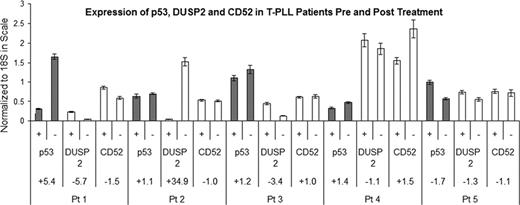Abstract
Abstract 2440
T-Cell prolymphocytic leukemia (T-PLL) is an aggressive chemotherapy-resistant hematological malignancy. This disease is more frequently reported in men and is exclusively reported in adults. Raised lymphocyte count, skin lesions and enlarged organs are the frequent clinical symptoms evident in this disease. T-PLL affects mature post-thymic T-cells. Most cases have the CD4+CD8- phenotype; however, 25% of cases do have the CD8+/CD4- phenotype. Currently there is no treatment available that achieves durable complete remission of T-PLL. Current frontline treatment consists of alemtuzumab, an anti CD52 antibody that is expressed on T and B cells and in most PLL patients. This treatment induces complete remissions (CR) in the majority (>50%) of patients that are not durable; median duration of remission is 6 months.
The first T-PLL patient exhibited de novo alemtuzumab resistance that we hypothesized was epigenetic in nature. Based on our work and that of others in B cell malignancies, we added cladribine (2-cda; 5mg/m2 d 1–5) while continuing alemtuzumab. The patient had a dramatic decline in her WBC count (Fig. 1) and achieved a peripheral blood complete remission by flow cytometry and PCR. Patient 2 was treated with alemtuzumab alone with complete remission that lasted 6 months when he relapsed with WBC count of 600,000 (Fig. 1). He underwent pheresis and was initiated on treatment with alemtuzumab and cladribine with some response but a pattern consistent with epigenetic resistance. The histone deacetylase inhibitor (HDACi), SAHA (vorinostat), was added (400 mg daily × 5 days) with a rapid decline in WBC count and CR by flow cytometry (Fig. 1). Based on these encouraging results, we have treated 3 additional patients in the frontline setting with alemtuzumab and cladribine (Fig. 1). All have responded with rapid decline in WBC counts with complete remission by flow cytometry and PCR. All of these newly diagnosed patients remain in complete remission by flow cytometry and PCR with followup of 1–14 months.
Epner:Merck: Consultancy, Honoraria, Speakers Bureau; Novartis: Speakers Bureau; Millenium: Speakers Bureau; Allos: Speakers Bureau; Enzon: Speakers Bureau; GSK: Speakers Bureau.
Author notes
Asterisk with author names denotes non-ASH members.


This feature is available to Subscribers Only
Sign In or Create an Account Close Modal